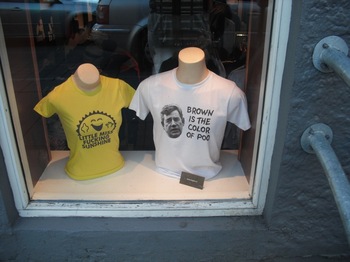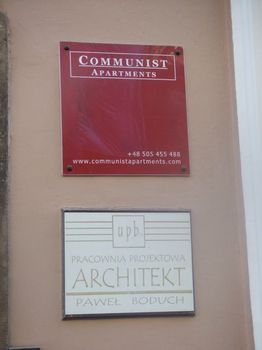We are developing the social individualist meta-context for the future. From the very serious to the extremely frivolous... lets see what is on the mind of the Samizdata people.
Samizdata, derived from Samizdat /n. - a system of clandestine publication of banned literature in the USSR [Russ.,= self-publishing house]
|
Starbucks was bad enough but McDonald’s is worse
– An anonymous art historian at the Louvre in Paris, reacting to the news that a McDonald’s will soon open at the famous museum. Come to think of it, when I visited the Louvre earlier this year, I discovered an exhibition devoted to “The Da Vinci Code”. Might I suggest that this is much, much worse.
There you were, in a world of pedants, clergymen and golfers…and here was this wonderful man who could tell you about the inhabitants of the sea, and who knew that the future was not going to be what respectable people imagined
– George Orwell on his discovery of the writing of H.G. Wells, as quoted by Cynthia Crossen of the Wall Street Journal, in a context that is quite worth reading, as is the follow up discussion at io9. Come to think of it, these sorts of “respectable people” (along with those who believe that housing is not a high risk investment and therefore expect to be bailed out with my savings when this turns out not to be so, those who are in favour of the television licence fee, and…) may be what I have in mind when I proclaim how much I despise the middle class, as I am prone to do.
The Castrol oil company (a subsidiary of BP) is about the run an advertising campaign that does the following:
At certain intersections, they will be erecting electronic billboards combined with cameras. Cameras will photograph registration plates of oncoming vehicles. Using the registration data, the make and model of car will be pulled from a database that has been helpfully sold to Castrol by the DVLA (ie the government body that handles vehicle registrations in most of the UK). The billboard will then displace to the motorist recommending which particular type of oil should be used in his car.
No registration data will be stored for later use. I guess that makes it all right then.
Someone please tell me that this is an April Fools joke. Yes, I know it is September.
Norman Borlaug has died. He may well have saved more lives than anyone else who has ever lived.

Reykjavik, Iceland. August 2009.
You can basically sum the UK government’s dilemma up as either they’re going to have to tell Gerry Adams he has to have a British ID card to live in NI or tell Iain Paisley he’s going to need a passport to travel from Belfast to London…
– An anonymous commenter, at The Register, discussing one of the minor obstacles to the British government’s ID card and e-borders schemes.
I have said it before. I am trying to remember if I lacked the nerve to use the full obscenity last time, or whether an editor removed it.
Once again, though, I cheer the demise of a loathsome Home Secretary, but acknowledge that it will make little difference.
There was a time that I thought that Michael Howard was an unusually and unpleasantly illiberal Home Secretary. In truth, that was a fair estimate of the man, but I did not know what was to come.
The occupation of a member of Parliament would thereupon become an occupation in itself, carried on, like other professions, with a view chiefly to its pecuniary returns, and under the demoralizing influences of an occupation essentially precarious. It would become an object of desire to adventurers of a low class, and 658 persons in possession with ten or twenty times as many in expectancy, would be incessantly bidding to attract or retain the suffrages of electors by promising all things, honest or dishonest, possible or impossible, and rivalling each other in pandering to the meanest feelings and most ignorant prejudices or the vulgarist part of the crowd
– J.S. Mill, quoted in The Times on March 13, 1906, discussing the likely consequences of paying MPs for their service. I hope Patrick Crozier will forgive me more more or less copying his post in its entirety, but it really deserves repeating.

Kraków, Poland. April 2009
Last September, I went walking in the Scottish Highlands with a good friend. My friend and I were booked on different flights leaving Edinburgh airport for London on Sunday evening. My friend then had a connecting flight at Heathrow to Hong Kong and then on to Sydney, so he was particularly eager not to miss his flight. Therefore, I dropped him off at the airport terminal before I went looking for a petrol station to refuel the rental car before returning it to the airport and checking in for my own flight.
The “Where the expletive is the nearest petrol station” dance before returning a rental car to an airport car rental office is one I know well, but this one wasn’t too bad. After driving a few kilometres down the M9 I saw a station on the other side of the road, so I exited the motorway at the next junction, crossed the bridge across the motorway, and found…
Well, I found myself myself in a new and better world, actually. It was an office park, but not just any office park. There was a big sign with an RBS logo, lots of gleaming buildings, water features (both active and passive), corporate sculpture, and the general sense of the intense self-regard held by the people who had had this place built. Clearly, RBS had decided that it needed a new, gleaming head office from which to run its überimportant global operations, and had had this Dr No like compound built near Edinburgh airport, where its highly sophisticated heart could beat, without any interruption or disturbance from reality. RBS’s dedicated motorway junction made it easy for these great bankers to come and go to and from wherever their business now was. I am sure there were also fancy gyms, day care centres, cafes and Lord knows what in the complex.
Having worked in international finance myself, this kind of arrangement is not that unheard of, particularly for banks that are big fish in whichever smaller pond that they originate from. I can think of one or two Spanish banks that have even more Dr No-like headquarters on the outskirts of Madrid. Usually the offices of the same organisations in major financial centres are much more normal – RBS has its London offices in a rather boring but shiny block near Liverpool Street Station.
However, to enter such a complex in Madrid, one faces barbed wire fences, metal detectors, ID checks, men in overly fancy uniforms, and probably finger prints and Iris scans. In Scotland on a Sunday afternoon I was able to drive into the complex by accident, and get lost in the private roads between the fancy new buildings. There were a few security guards around, and I suspect that if I had got out of my car and walked near any of the buildings I may have been challenged, but driving around for a few minutes led to little interest. Eventually I found the entrance ramp to the motorway, which was on the other side of the complex to the exit, so it seemed it was not possible to use the RBS offices to turn around without driving through the private office park. I then refuelled my car and drove back to Edinburgh airport.
However, that of Micklethwait’s laws that says that any company that builds a new and ultra-fancy office is doomed, whereas an important company that is still operating out of grimy offices in Basingstoke is probably okay very manifestly holds, I think.
From time to time (on this blog and in other places) I call for the abolition of the BBC. Often, someone smug and patronising in the comments will say something along the lines of “Only you heartless and uncultured libertarians would fail to realise that there are some worthwhile/needed/educational programs that will not be produced by the market.
My usual response to this is that we will never know, because the market has never been allowed to demonstrate what it might produce. I have written before about the weird history of British television and how owners of private television channels had little if any control of their own programming. But in some ways radio is even weirder. For one thing, there were no privately owned and/or commercially funded radio stations in the UK before 1973. There are many today, and some might argue that this proves some sort of market exists, but this is still a weird, weird world.
For instance, the highly self-important telecommunications regulator Ofcom, which helpfully “exists to further the interests of citizen-consumers as the communications industries enter the digital age”, made a particularly delightful ruling.
Ofcom staff listened to Bristol radio station GWR FM, and determined that 53% of the music it played was more than two years old. As a consequence, they threatened to take away the station’s licence and force it off the air. This is a commercial, privately owned radio station.
Really.
|
Who Are We? The Samizdata people are a bunch of sinister and heavily armed globalist illuminati who seek to infect the entire world with the values of personal liberty and several property. Amongst our many crimes is a sense of humour and the intermittent use of British spelling.
We are also a varied group made up of social individualists, classical liberals, whigs, libertarians, extropians, futurists, ‘Porcupines’, Karl Popper fetishists, recovering neo-conservatives, crazed Ayn Rand worshipers, over-caffeinated Virginia Postrel devotees, witty Frédéric Bastiat wannabes, cypherpunks, minarchists, kritarchists and wild-eyed anarcho-capitalists from Britain, North America, Australia and Europe.
|





